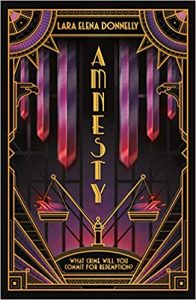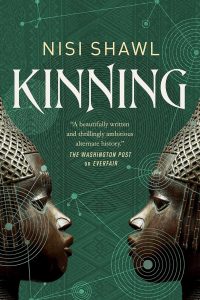Katharine Coldiron Reviews Amnesty by Lara Elena Donnelly
 Amnesty, Lara Elena Donnelly (Tor 978-1-25017-362-1, $18.99, 384pp, tp) April 2019.
Amnesty, Lara Elena Donnelly (Tor 978-1-25017-362-1, $18.99, 384pp, tp) April 2019.
“It is not easy,” Aristide Makricosta tells a gathered crowd early in Amnesty, “to destroy your life. To coat the things you love in kerosene and light a match.” He is talking about Cordelia Lehane, a burlesque dancer turned resistance leader, who did exactly that when she decided to fight against the fascism sweeping across Amberlough. Cordelia had a starring role in Amberlough and Armistice, the first two books of Lara Elena Donnelly’s Amberlough Dossier, but she is absent from the third. And she is sorely missed – not just by the characters, but by the reader, who could use some of her grit and bawdy humor to balance out a sad, talky book. Amnesty is a satisfying conclusion to a set of books stuffed to the brim with detail and machination, but its appeal is somewhat stunted by character problems, as well as its own intricacy and darkness.
Amnesty continues shortly after Armistice left off. The fascist government has been toppled at last. Lillian DePaul, a political strategist with more vulnerable points than a shell-less turtle, is slowly becoming insolvent as she scrapes for a job in the new order. Her son, a petulant teenager, has been all but expelled from the fancy school that the DePauls have attended since time immemorial. Meanwhile, Lillian’s brother, Cyril DePaul – double agent, cynic, and bargaining chip – is alive, it turns out. Aristide, Cyril’s one-time lover, must try to save Cyril from his pending execution, and his attempts to do so grow ever more frantic and risky. The first post-fascist election approaches, and the candidates are both terrible, for different reasons. Will Amberlough and its citizens ever return to their former glory?
I’m sorry to contradict Liz Bourke in the pages of this magazine, but the Amberlough Dossier is not a fantasy trilogy. The books are spy thrillers through and through. Although set in a fictional universe that uses interwar Berlin (specifically the city in Cabaret) as a jumping-off point, there’s no magic in the Dossier, nor are there imaginary creatures. The books are heavily plotted and highly political, involving gambits and betrayals, secret conferences and tapped phone calls – all of which moves along at a fast clip.
All three books have a persistent cinematic quality, but particularly Amnesty. The characters never seem to stop talking, and Donnelly lavishes her exceptional descriptive powers on clothes, objects, and decorations, as if she’s storyboarding. In addition, her invented slang steals the show sometimes: “I don’t trust you past your jess if that tow-headed turncoat has a hand free to haul down his zipper. Stones, I wouldn’t trust you even if he was in shackles.”
Amnesty makes it clear that this trilogy has truly been about Aristide, about his slide from gamesmanship and performance into desperation and alcoholism. In this book, Ari actually falls to his knees and begs another character for help: “If he had been under a spotlight, he would have been someone else. Only putting on a show. But he wasn’t stagefolk anymore. He meant everything he did this time, and felt it.”
The problem with centering Aristide in the trilogy’s narrative is an assumption that the audience loves him. Although these books have a fervent fan base – and for them, Amnesty will satisfy in spades – readers who have never ceased finding Ari obnoxious will enjoy this third installment even less than the first two. At one point, his companion asks, “What is wrong with you, Aristide?” and it’s about time someone did.
Ari’s love for Cyril is still touching, but the resurrected Cyril is a very different man. Wracked with PTSD, hoarding food and cigarettes, constantly looking over his shoulder, terrified of being touched – this is not the scheming spy coaxed out of respectability, but a broken person: “All his reactions were compromised by the memory of violence.” He forms a fairly destructive friendship with his misbehaving nephew, teaching him to build pipe bombs and to value his rebellious tendencies. Other than that, Cyril has little to do in Amnesty except wait for death.
Because the Amberlough Dossier is about a government that succumbs to fascism and then to war, the books might seem to be relevant to our current moment. Amnesty is not, or not directly so. The election adding tension to the background of the novel resists comparison to the election of 2016. The rebuilding Amberlough must do is close to postwar Germany, but the spoils have been divided differently. Truly, it’s a fictional spy thriller, and for that reason, it could be a welcome escape from the real political pressures of 2019. However, the characters’ struggles are extremely dark and difficult. The tight plotting and breakneck speed of the first two books seems inappropriate here, as none of the characters is having a good time anymore. Instead, they’re gasping for air while drowning in trouble.
“‘Of course I got in trouble,’ Cyril says about his school days. ‘I’m still in it. One giant slog of trouble from then ’til now.’ He could feel it all stuck to his boots with every step.” The glamor and appeal of Amberlough has waned, alas, until this is the most prominent theme of Amnesty: trouble, trouble, all the livelong day.
Katharine Coldiron is the author of Ceremonials (Kernpunkt Press), an SPD fiction bestseller. Her work as a book critic has appeared in The Washington Post, The Believer, The Guardian, and many other places. She lives in California and at kcoldiron.com.
This review and more like it in the June 2019 issue of Locus.
 While you are here, please take a moment to support Locus with a one-time or recurring donation. We rely on reader donations to keep the magazine and site going, and would like to keep the site paywall free, but WE NEED YOUR FINANCIAL SUPPORT to continue quality coverage of the science fiction and fantasy field.
While you are here, please take a moment to support Locus with a one-time or recurring donation. We rely on reader donations to keep the magazine and site going, and would like to keep the site paywall free, but WE NEED YOUR FINANCIAL SUPPORT to continue quality coverage of the science fiction and fantasy field.






